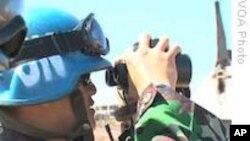The United Nations has been deploying peacekeepers to trouble spots around the world for more than 60 years.The U.N. Security Council authorizes deployment of peacekeepers to countries torn by conflict to help create conditions for lasting peace. Today, more than 90,000 men and women from more than 100 countries wear the "blue helmet" of the United Nations. VOA U.N. Correspondent Margaret Besheer recently visited the U.N. mission in southern Lebanon - known as UNIFIL - to find out more about what peacekeepers do.
More than 12,000 peacekeepers from 28 countries are deployed in Lebanon, in one of the UN's largest missions. These men and women are part of the Indonesian contingent. U.N. peacekeepers first came to Lebanon in 1978. They have been a buffer between Israel and militants in southern Lebanon.
In August 2006, as part of the truce that halted the war between Israel and Hezbollah, the UN mission was strengthened. Today, these peacekeepers monitor that fragile truce.
Lt. Colonel Hari Mulyanto from Indonesia says his peacekeepers assist the local population in many ways. "As peacekeepers we not only conduct patrols, we also do humanitarian assistance. We cooperate with the local people, with other organizations - international organizations or non-governmental organizations," he says.
Here, as in other missions, peacekeepers work with the national military to support and train them. The work of peacekeepers is not just in the field. Here we have a vocational training program that UNIFIL is running for residents in South Lebanon, where they are teaching young boys to be mechanics.
In this class, U.N. peacekeepers have traded their blue berets for overalls and are teaching these boys skills that will help them find jobs. Economic development is seen as a factor in bringing stability to post-conflict societies.
UNIFIL also runs health clinics, infrastructure projects and programs to educate school children about the dangers of landmines. Once a male domain, today about 3,000 women are deployed as UN peacekeepers or police. The United Nations hopes more women will join these ranks.
First Sergeant Nina has been a UNIFIL police officer for 9 months. "I and my friends are international military police doing our job as patrolling, checkpoints, investigating for accidents or incidents…The other women peacekeepers are soldiers," she says.
Peacekeepers also protect civilians. Here the local residents mostly welcome them. "They come, they say 'hello', we say 'hello'. They don't hurt us and we don't hurt them," says one resident.
Peacekeepers live far from home for long periods, often under difficult and dangerous conditions. Many have been killed in the line of duty. But despite that, many here say they would do it again.
News
12,000 UN Peacekeepers Keep the Peace in Southern Lebanon
update

<!-- IMAGE -->




